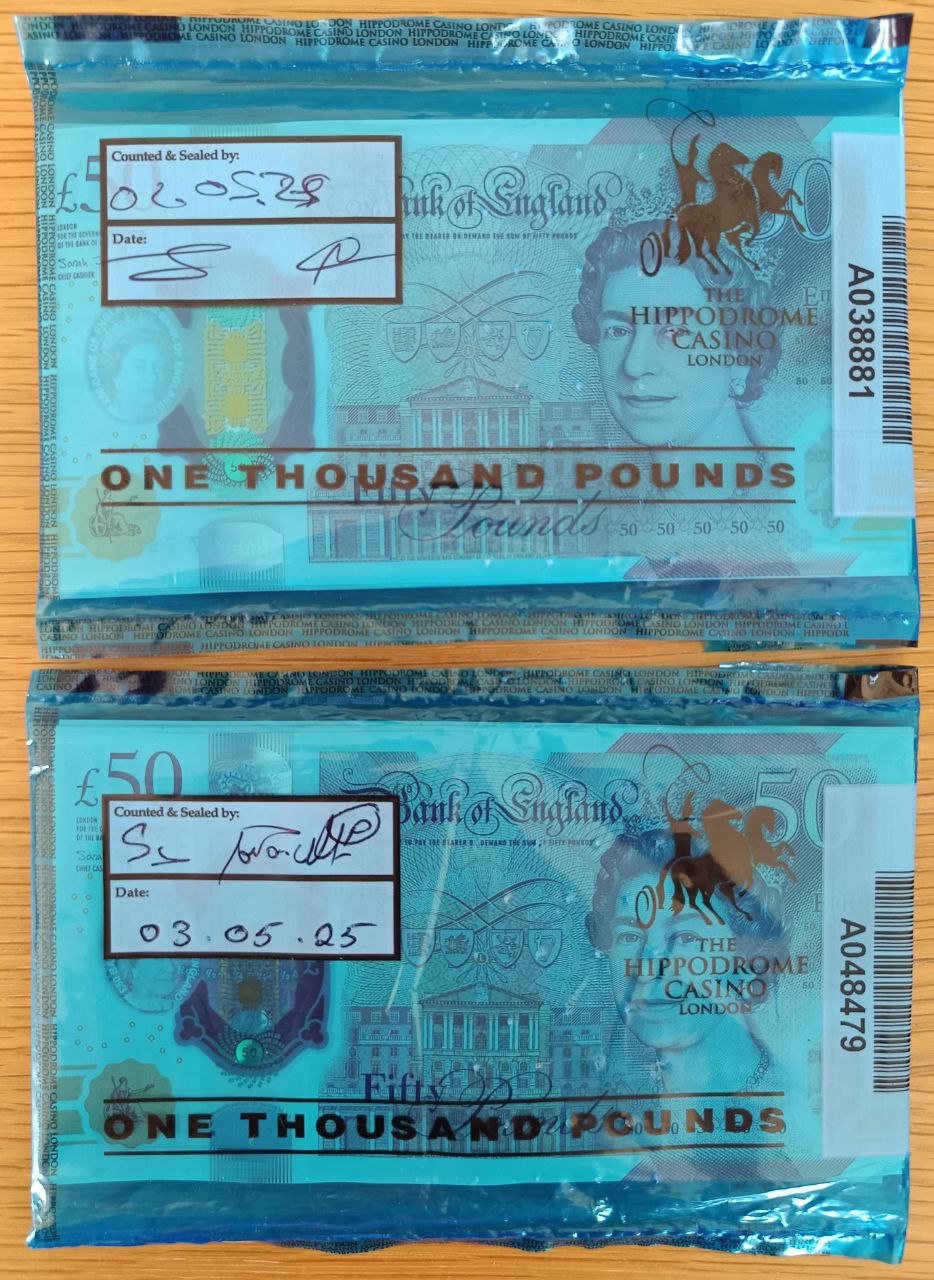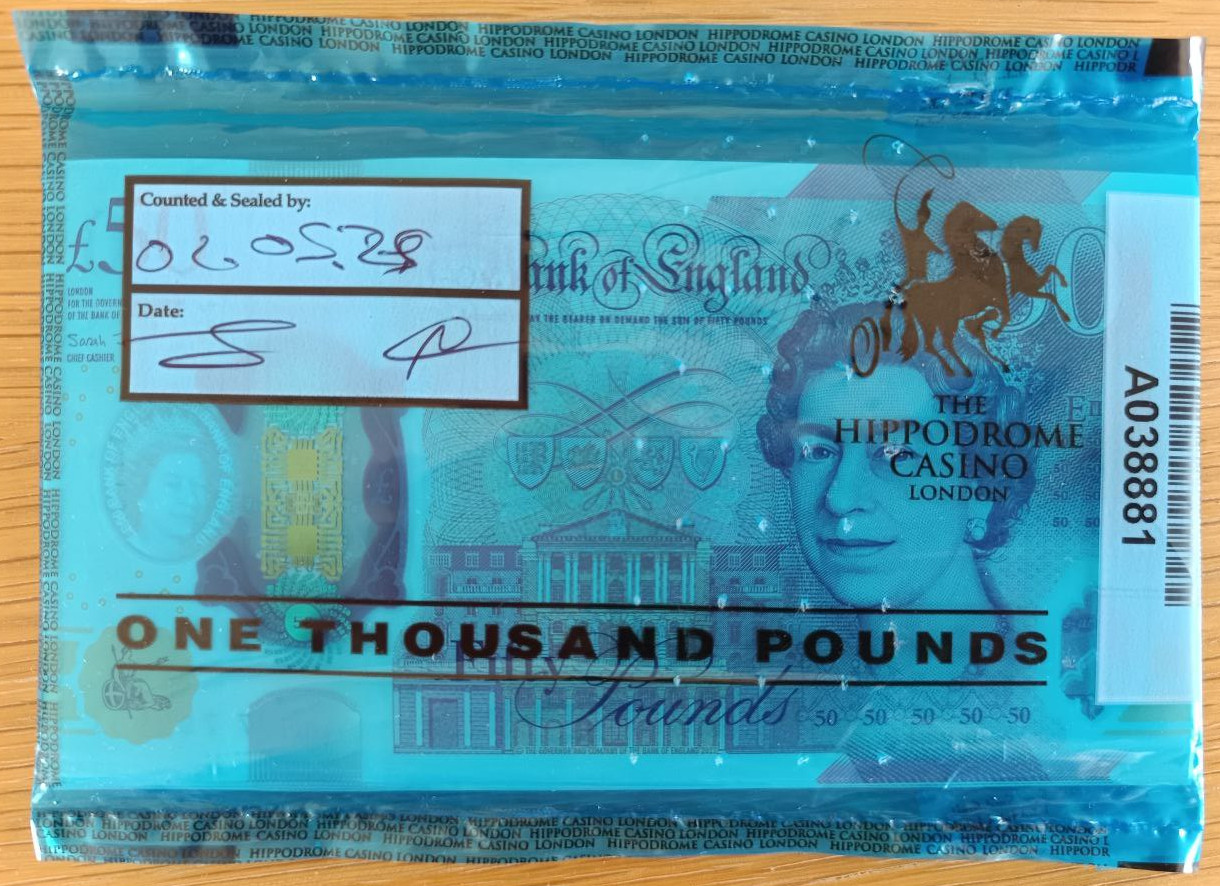Hippodroddimus Adventures
jim's poker web log
Post 3: more session reports
10th of May, 2025
Day 8, lose my 150 pound buy-in in the first hand going all-in pre with AQo, lose another 150 buy-in, down to the last 150 I brought with me to the Hippo, that dwindles down to 50 pounds, but I don't let that tilt me... spin it up to 500 pounds, keep grinding, end the day with 177 pounds for a loss of 273 pounds. A bad start -- but this was on the 7th of May... it motivated me to write the post below about Limon... lesson: disciplin and patience and stuff.
Day 9, bought in 150 and ran it up to 800 pounds and 50 pence. Played well but not quite perfect, a couple of loose opens which cost me at least a little bit. Overall though, playing more disciplined and carefully.

Hmm, I guess I can try to remember a hand or two. A lot of just... sensing weakness, then betting big (or whatever size is appropriate... often big OTR). Also, some playing of big hands passively, e.g., just calling KK pre when shallow, sizing things so that it's always a relatively small call to the pot for my opponent to call... easy money. Also, there's the classic live dynamic where you can play super tight, then players still just give u so much action with trash... like, 3-bet your EP open with 77 for like value or something? even though it's worse than pretty much every hand I'm opening... and these are the "solid" players. Yeah, that's another thing... you can be at a "bad" table, where every player is a regular... but they're all straddling and stuff. I'm not sure, it might be better than random rec tables... the main difference is that the regs are easier to predict and play deeper stacked (buy in for 400 pounds), play longer. Anyway, on day 9 I transfered from a table like that to a table of recs. Was a good idea, but it's not quite as clear-cut as one might think, I reckon.
Post 2: distilling limon
8th of May, 2025
I've been re-reading Limon's fantastic 2009 twoplustwo thread random shyt. I'll write up some thoughts I have about the topics he discusses.
-
Pay Attention
Limon's first lesson for us is the absolute importance of paying attention. Every significant observation one makes of an opponent at the poker table helps build up one's profile of that player. If one pays close attention, one quickly identify the various skill-levels of one's opponents, whether they have a lot of gamble, whether they are capable of making big bluffs (or big folds), whether they're loose players or tight players, what tells one's opponents have... even signs that they've hit some kind of breaking point and are about to totally reverse their play style. All of these things contribute massively to one's win-rate, so the player that plays close attention will vastly out-profit the player absorbed by his phone. It's like the difference between a thinking player and a non-thinking player (i.e., a player that's capable of hand-reading vs a player that's not).
-
Use Exploitative Bet-Sizing
Figure out why you're betting, then pick the bet size that best accomplishes that. This involves careful handreading and understanding of opponent psyche. If the point is to get a certain part of their range to fold (i.e. a bluff), bet the smallest size that would get that range to fold (so your bluff is as cheap as possible). If the point is to get value from a certain range, bet the most that it calls.
This can probably be broken into two parts:
(1) finding the right general zone for one's bet (i.e., min bet, ... , all in), then
(2) honing in on the exact size.Practically, this means never rushing to make a bet (rather, taking one's time to thinking things through), on top of always consciously keeping in mind the rough shape of one's opponent's hand range.
IIRC this is Charlie Carrel's dictum: "Why is one betting? What size best accomplishes this end?"
-
Adjust to Deep Stack Play
Limon doesn't really go into detail about this point, and frankly I don't really know how to adjust well to deep stack play. But I'll lay out some thoughts here nonetheless.
- (1) Knowing when one's opponent is at the bottom of his range
- Then being unafraid to battle.
- (2) Running away when only better players than one are deep with one
- high-variance against players against whom one may-or-may-not
- (3) Position becomes more important
- More chips --> more actions --> more times at which position is valuable
- (4) Best-hand / cooler ability increases greatly in importance
- Deep stacked the value of weak flushes etc. goes down a lot, the nuts goes up a lot (i.e., Kx-suited, Ax-suited are worth more, low suited-connectors, less)
- (5) avoiding capping one's range probably becomes more imporant>
- players have more leverage against u when you're deep. This one is very speculative... i rmemeber GTO type players saying that sims show less range protection stuff than one might expect (but that was at 100bb)
- (6) larger bets
- one wants to get more money in faster
-
people's responses and non-respones
When players are asked certain things, they're forced to respond. E.g., "how deep are you"?, "so, it's 100 pounds more for me to call?" Questioning a players stack-depth after they go all-in is a good one. "You got about 1000?" I'll have to try that out. I suspect players will tend seem pusillanimous when weak, suave when strong. Tells that apply in these enorma pengar, high-edge (i.e., not pre-flop (where equities run close)) scenarios are some of the most important.
Other examples where the player has to / will respond:
- you got any big chips there?
- you got any chips in your hands?
- did you buy in for too much? are those chips in play?
- oh, is the action on me?
- you got any big chips behind there?
- are those stacks 20s?
One's interpretation of the player's response will depend heavily on priors; i.e., whether the player is the kind of player likely to be able to convincingly act weak / timid / etc., or whether he's likely to be able to convincingly act strong when weak, whether he's likely to be silent / non-responsive when strong vs. weak. This is an interesting question: which kinds of players are likely to be non-responsive when strong? Which when weak? I don't have clear, realised answers to these questions. -
figuring out when an opponent is unwilling to wager his stack
this is a sixth-sense type thing, can try to develop it
-
goal is always to play perfectly
trying to chase losses or show a win or whatever is not relevant
-
Discipline and patience above all
Even players who are terrible in terms of the spectrum of serious players can stick around for a long time if they're disciplined; even the very best players can go broke over the span of a week if they don't manage their BR sensibly. Not tilting >>>> any other skill
-
building player profiles
just related to paying close attention, but I should expand on this... being able to do this quickly & accurately is super paramount
Post 1: spinning up £300
7th of May, 2025
I'm in London, staying with a friend. No money, so borrow 300 of my friend's out-of-circulation pounds they have lying around, convert it into something usable, take it to the Hippodrome Casino, and play poker.

Start off playing conservatively, win a few hundred pounds over the first two days. Third day, play loose and poorly and lose my winnings + more. Down to 140 pounds total.
Day four, spin that 140 up to 356... I learned my lesson from my big loss and am not fucking around even an iota.
Day five I grind hard. Play at the Hippo, build a stack, cash out so I don't have to play deep. Walk down the road and play at the Empire, do the same thing. Return to the Hippo... won 265 that day (hard fought for pounds)
Day six, win 775 playing 1/3 (bought in for 150, built a stack).
Day seven, buy in 140, build it up to 727, cash out.

So, now my bankroll is 1850 pounds (I spent some on food etc.), which is... slowly approachinig an actual bankroll for 1/2 no-limit hold'em.
I just need to keep playing solidly, and practicing conservative bankroll management.